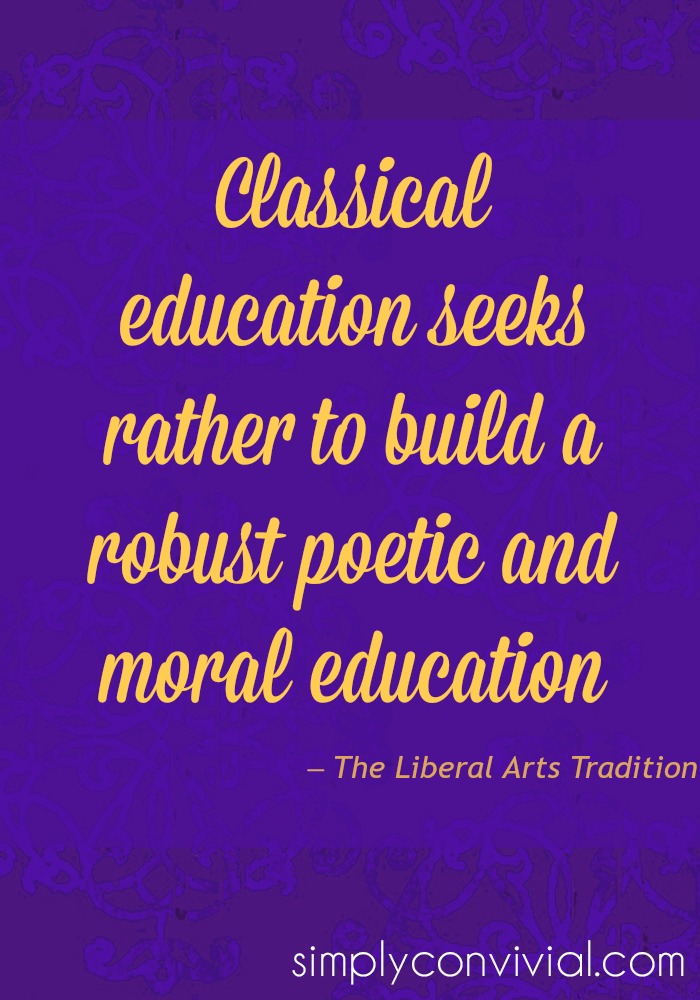Ok. When I asked what education book I should read next, the overwhelming response was The Liberal Arts Tradition, and you all did not steer me wrong.
Between Consider This, The Liberal Arts Tradition, and The Living Page, I feel ready to tackle planning 7th grade for next year.
You better believe my quotes for the next few weeks will be from this brief but packed little book. I am an English major and love the language arts emphasis of the trivium, but it is refreshing to read about the liberal arts tradition from the perspective of math people, which the authors are.
Virtue = Piety = Education’s Aim
Piety signifies the duty, love, and respect owed to God, parents, and communal authorities past and present.
Some say virtue, some say piety, but we are speaking of the same thing: The goal of education is the cultivation of virtue. Education is seeking wisdom.
Yet all education takes place in a context of mythos (story), logos (reason), and practices.
These three components make up education – any education – and I think that’s why movies and television form the greater part of our culture’s general education. Watching is the culture’s practice and they provide the stories everyone shares. Even daytime hours at school full of reason-based teaching cannot undo the formative practices of the home and of the stories we consume.
And that’s why to be counter-cultural we must be reading aloud (or listening to many audio books).
The authors also pinpoint where those of us attempting to recover the classical tradition need to focus our energies, where we need to differentiate ourselves not only from conventional schools but even from temptations toward easier versions of the tradition:
[In the elementary years] Classical education seeks rather to build a robust poetic and moral education before it moves to analysis or critique.
Or, at least, let’s hope it does, because –
Education is not merely an intellectual affair, no matter how intellect-centered it must be, because human beings are not merely minds.
The authors critique the approach to the “grammar stage” in classical circles without rejecting the entire package. In fact, they deftly turn the argument to showing that it has been more semantics than practice that is the problem:
While schools in the Christian classical renewal have imagined themselves to be teaching grammar […] they have actually been engaged in the truly classical enterprise of musical education.
Then, the more we embrace the correct semantics, the proper definitions, the better we can fulfill them and meet the expectations and standards they provide for us. For then,
History would not be so many facts to memorize, however creatively we do it, but an opportunity to use stories from the past to build up a child’s moral imagination.
The chapters on a gymnastic and musical education were primarily about the elementary years of education and what should comprise those years and why. Both music and gymnastics (different then than now) were vital to Plato’s vision of bringing up young children. As I read these sections, I noted what makes up this classical way:
- physical training (self-discipline included)
- singing
- memorizing
- poetry
- acting (including imaginative play)
- drawing
- sculpting
- hero stories
- literature
- nature study (including time spent outdoors)
Remember Ten Ways to Destroy the Imagination of a Child? In short, a classical education offers ten ways to build the imagination of a child, and that is our proper business as educators but also primarily as mothers.



I hope that you share as you plan for your 7th grader. I have a boy going into 7th grade next year too. I am planning on using AO as our base, but I still don’t have all the details down. I would sure love to get some ideas.
Oh, I will definitely write about it once I have it worked out. :) I believe Plutarch ala Ambleside will be part of the plan. What I need to do next is look at different logic programs.
“In short, a classical education offers ten ways to build the imagination of a child, and that is our proper business as educators but also primarily as mothers.”
You think through so thoroughly. Wow. I loved this book, bit again you clarify it.
Thanks, Mystie.
I was wondering if you are liking Own Your Life? I read the preview at Amazon, so I got a very small taste. But I have enjoyed other recommendations from you, so thought I’d ask what you think so far. Also, do you think it would work for a group of ladies to read and discuss? Ladies who are all moms; some working, some stay at home, some homeschool, some public school.
I’ve only read the first chapter so far, which has been mostly her story. I have enjoyed other of Sally Clarkson’s work, so I expect to enjoy it, but I’ll be sure to write about it when I get further in. :)
testing comments
Test
Testing.
And also: I really want to read Ordinary!! :)
I want to read Ordinary, too.
It worked! :)